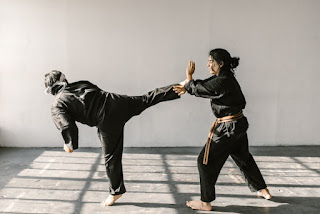Self-defence and martial arts are great ways to gain confidence, and discipline, and stay physically fit. As a transwoman in India, learning self-defence and martial arts can be empowering and help you feel more secure in your daily life. There are many different styles of martial arts and self-defence, each with its unique set of techniques and approaches. In this guide, we will explore the best ways to learn self-defence and martial arts in India, with a particular focus on the needs and concerns of transwomen.
1. Research Different Styles of Martial Arts
Before you start your training, it's essential to research the different styles of martial arts and self-defence to find one that fits your needs and preferences. There are many styles to choose from, including Brazilian Jiu-Jitsu, Krav Maga, Karate, Taekwondo, and Judo, among others. Each style has its unique set of techniques, philosophies, and training methods, so it's essential to do some research to find the one that best suits you.
2. Find a Reputable Martial Arts School
Once you've decided on the style of martial arts you want to learn, the next step is to find a reputable martial arts school. It's essential to choose a school with experienced and knowledgeable instructors who can guide you through the learning process. Look for schools with a good reputation and positive reviews from past students. Consider visiting the school and observing a class before enrolling to ensure it's a good fit for you.
3. Consider a Women's-Only Class
Many martial arts schools offer women's-only classes, which can be a great option for transwomen who may feel more comfortable training in a gender-specific environment. Women's-only classes often focus on teaching techniques that are specific to women's self-defence needs, such as defending against sexual assault and harassment.
4. Communicate with Your Instructors
When you start your training, it's essential to communicate with your instructors about any concerns or needs you may have. As a transwoman, you may have unique concerns related to your safety and comfort, and your instructors can help you address these concerns. Be upfront with your instructors about your needs, and they can work with you to create a safe and inclusive training environment.
5. Start Slowly and Progress Gradually
When you start your training, it's essential to start slowly and progress gradually. Martial arts can be physically demanding, and it's essential to build up your strength and endurance over time. Don't push yourself too hard too soon, as this can lead to injury or burnout. Listen to your body and take breaks when needed.
6. Practice Regularly
Like any skill, martial arts require regular practice to improve. Try to practice your techniques outside of class, either at home or with a training partner. This can help you reinforce what you've learned and improve your muscle memory. Regular practice will also help you build your confidence and self-assurance.
7. Focus on Defense Techniques
As a transwoman, you may have specific concerns related to self-defence. It's important to focus on defence techniques that are effective in real-life situations. Look for classes that teach techniques specifically designed for self-defence, such as escapes from grabs and holds, strikes to vulnerable areas, and situational awareness.
8. Build Your Confidence
One of the benefits of learning martial arts and self-defence is building your confidence. Martial arts can help you develop a sense of self-assurance and assertiveness that can be invaluable in everyday life. As a transwoman, building your confidence can be especially important in situations where you may feel vulnerable or unsafe.
